Nori Canine TNF RI ELISA Kit
$508.00 – $916.00
This ELISA kit is for quantification of TNFRI in canine. This is a quick ELISA assay that reduces time to 50% compared to the conventional method, and the entire assay only takes 3 hours. This assay employs the quantitative sandwich enzyme immunoassay technique and uses biotin-streptavidin chemistry to improve the performance of the assays. An antibody specific for TNFRI has been pre-coated onto a microplate. Standards and samples are pipetted into the wells and any TNFRI present is bound by the immobilized antibody. After washing away any unbound substances, a detection antibody specific for TNFRI is added to the wells. Following wash to remove any unbound antibody reagent, a detection reagent is added. After intensive wash a substrate solution is added to the wells and color develops in proportion to the amount of TNFRI bound in the initial step. The color development is stopped, and the intensity of the color is measured.
Alternative names for TNF RI: tumor necrosis factor receptor I, CD120a, TNFRI, TNFRSF1A, death receptor, TNFR1, TNFR-1
This product is for laboratory research use only, not for diagnostic and therapeutic purposes or any other purposes.
- Description
- How Elisa Works
- Product Citations
- Reviews (0)
Description
Nori Canine TNF RI ELISA Kit Summary
Alternative names for TNF RI: tumor necrosis factor receptor I, CD120a, TNFRI, TNFRSF1A, death receptor, TNFR1, TNFR-1
Alternative names for canine: dog
| Assay Type | Solid Phase Sandwich ELISA |
| Format | 96-well Microplate or 96-Well Strip Microplate |
| Method of Detection | Colorimetric |
| Number of Targets Detected | 1 |
| Target Antigen Accession Number | A0A8C0TE64 |
| Assay Length | 3 hours |
| Quantitative/Semiquantitative | Quantitative |
| Sample Type | Plasma, Serum, Cell Culture, Urine, Cell/Tissue Lysates, Synovial Fluid, BAL, |
| Recommended Sample Dilution (Plasma/Serum) | No dilution for sample <ULOQ; sufficient dilution for samples >ULOQ |
| Sensitivity | 2.5 pg/mL |
| Detection Range | 12.5-800 pg/mL |
| Specificity | Canine TNF RI |
| Cross-Reactivity | < 0.5% cross-reactivity observed with available related molecules, < 50% cross-species reactivity observed with species tested. |
| Interference | No significant interference observed with available related molecules |
| Storage/Stability | 4 ºC for up to 6 months |
| Usage | For Laboratory Research Use Only. Not for diagnostic or therapeutic use. |
| Additional Notes | The kit allows for use in multiple experiments. |
Standard Curve
Kit Components
1. Pre-coated 96-well Microplate
2. Biotinylated Detection Antibody
3. Streptavidin-HRP Conjugate
4. Lyophilized Standards
5. TMB One-Step Substrate
6. Stop Solution
7. 20 x PBS
8. Assay Buffer
Other Materials Required but not Provided:
1. Microplate Reader capable of measuring absorption at 450 nm
2. Log-log graph paper or computer and software for ELISA data analysis
3. Precision pipettes (1-1000 µl)
4. Multi-channel pipettes (300 µl)
5. Distilled or deionized water
Protocol Outline
1. Prepare all reagents, samples and standards as instructed in the datasheet.
2. Add 100 µl of Standard or samples to each well and incubate 1 h at RT.
3. Add 100 µl of Working Detection Antibody to each well and incubate 1 h at RT.
4. Add 100 µl of Working Streptavidin-HRP to each well and incubate 20 min at RT.
5. Add 100 µl of Substrate to each well and incubate 5-30 min at RT.
6. Add 50 µl of Stop Solution to each well and read at 450 nm immediately.
Background:
Tumor necrosis factor receptor 1 (TNFR1), also known as tumor necrosis factor receptor superfamily member 1A (TNFRSF1A) and CD120a, is a ubiquitous membrane receptor that binds tumor necrosis factor-alpha (TNFα).[1] The protein is a member of the tumor necrosis factor receptor superfamily, which also contains TNFRSF1B. TNFR1 is one of the major receptors for the tumor necrosis factor-alpha. This receptor can activate the transcription factor NF-κB, mediate apoptosis, and function as a regulator of inflammation. Antiapoptotic protein BCL2-associated athanogene 4 (BAG4/SODD) and adaptor proteins TRADD and TRAF2 have been shown to interact with this receptor, and thus play regulatory roles in the signal transduction mediated by the receptor.[2] Germline mutations of the extracellular domains of this receptor were found to be associated with the human genetic disorder called tumor necrosis factor associated periodic syndrome (TRAPS) or periodic fever syndrome.[3] Impaired receptor clearance is thought to be a mechanism of the disease. Mutations in the TNFRSF1A gene is associated with elevated risk of multiple sclerosis. Serum levels of TNFRSF1A are elevated in schizophrenia and bipolar disorder,[4] and high levels are associated with more severe psychotic symptoms.[5] High serum levels is also associated with cognitive impairment and dementia.[6][7] TNFR1 is an ATPase regulated by silencer of death domain.[8]
References
- Schall TJ, et al. (1990). Cell. 61 (2): 361–70.
- Hsu H, et al. (1996). Cell. 84 (2): 299–308.
- Kümpfel T, Hohlfeld R (2009). Nat Rev Neurol. 5 (10): 528–9. doi:1038/nrneurol.2009.154.
- Hope S, et al. (2009). Bipolar Disord. 11 (7): 726–34.
- Hope S, et al. (2013). Schizophr. Res. 145 (1-3): 36–42.
- Buchhave P, et al. (2010). Neurobiol. Aging. 31 (11): 1877–84.
- Diniz BS, et al. (2010). J. Alzheimers Dis. 22 (4): 1305–11.
- Miki K, Eddy EM (2002). Mol. Cell. Biol. 22 (8): 2536–43.
Be the first to review “Nori Canine TNF RI ELISA Kit”
You must be logged in to post a review.
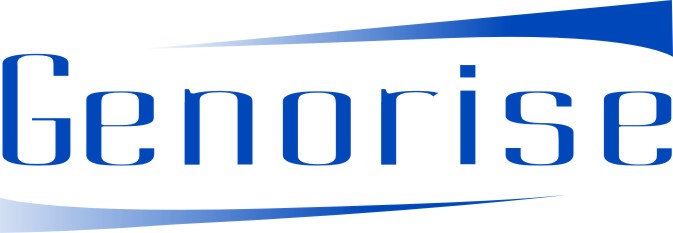






















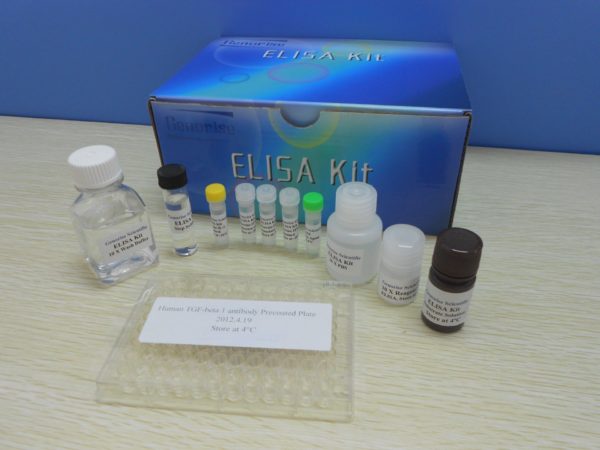
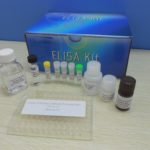
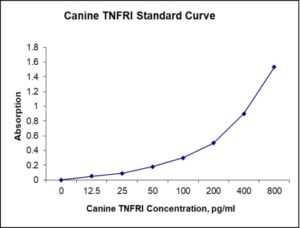
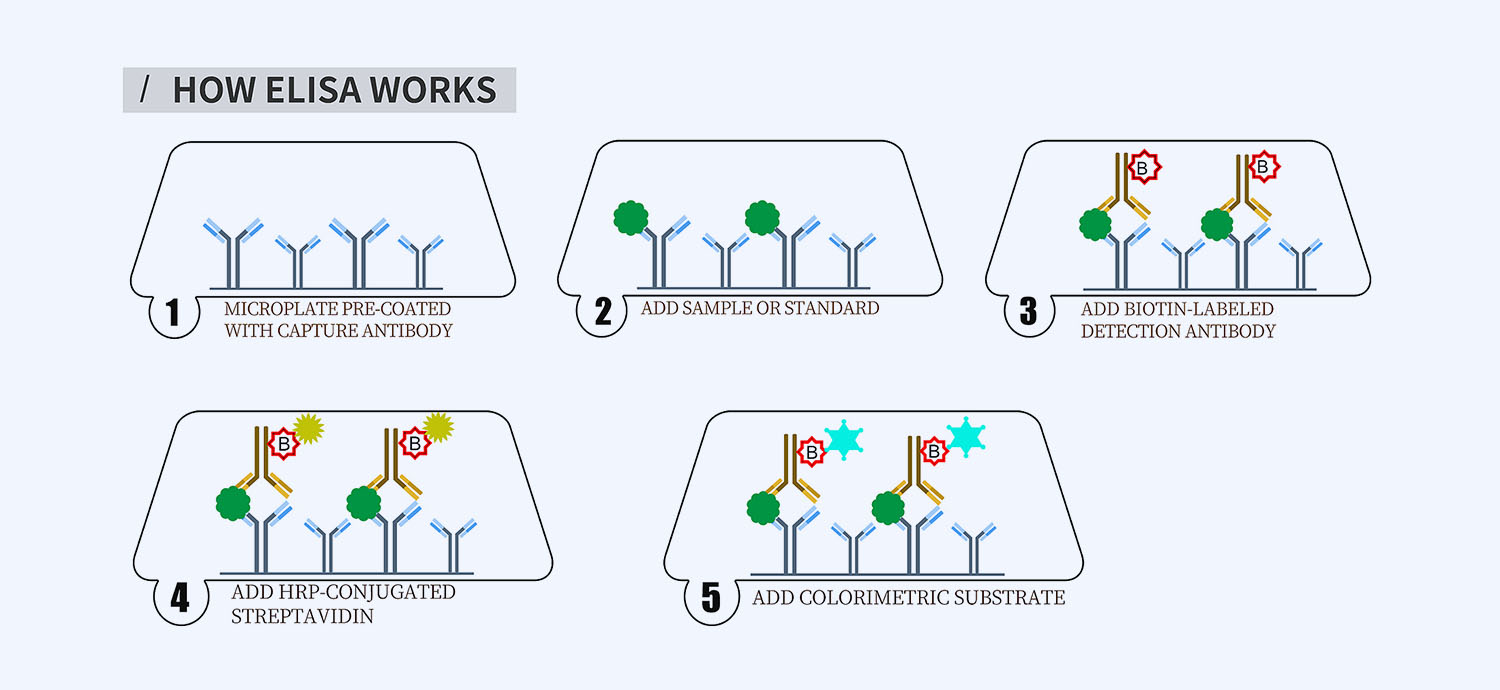
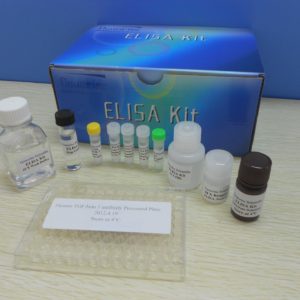
Reviews
There are no reviews yet.